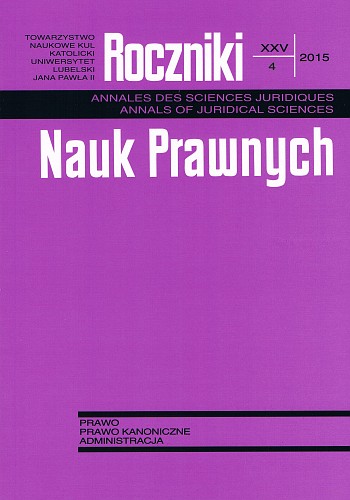Akty nadzwyczajnego zarządzania w Kodeksie Prawa Kanonicznego z 1983 r.
Acts of Extraordinary Administration in the 1983 Code
Author(s): Stanisław DubielSubject(s): Canon Law / Church Law
Published by: Towarzystwo Naukowe KUL & Katolicki Uniwersytet Lubelski Jana Pawła II
Keywords: administration of ecclesiastical goods;act ordinary and extraordinary administration;
Summary/Abstract: This paper concerns the act of extraordinary administration provided in c. 1277 and 1281 §§ 1-2. The concept “act of extraordinary administration” is a technical term used for the purpose of identifying an act of administration which exceeds the limits and manners of ordinary administration. The author clarifies that the Conference of Bishops determines acts of extraordinary administration for the diocese (c. 1277) and that for public juridical persons subject to the diocesan bishop, determination is achieved by (a) the statutes, (b) if the statutes are silent on this point – the diocesan bishop following consultation with the diocesan financial council (c. 1281 § 2). If a particular act is not determined as an act of extraordinary administration in iure universali and in iure particulari it then remains an act ordinary administration. The legislator provides different administrative procedures to carry out acts of extraordinary administration for diocesan goods and for juridical persons subject to the diocesan bishop (e.g.parish goods). In the instance of goods belonging to the diocese, the diocesan bishop is required to obtain the consent of the finance council and the college of consultors (c.1277). The same procedure is to be applied for acts of extraordinary administration expressly provided for by the universal law or stated in the documents of foundation. In the instance of goods belonging to parish, the parish priest requires to obtain the faculty from the ordinary (c.1281 § 1).
Journal: Roczniki Nauk Prawnych
- Issue Year: 25/2015
- Issue No: 4
- Page Range: 113-131
- Page Count: 19
- Language: Polish

